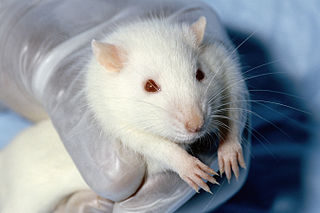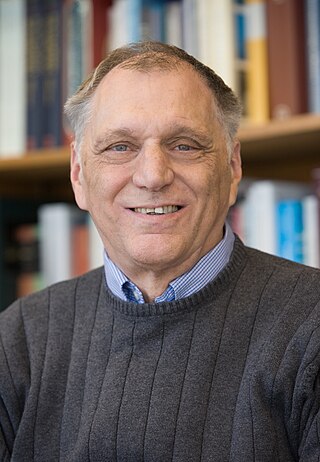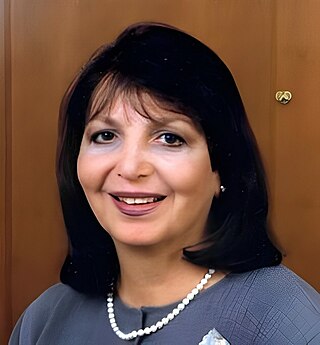
Michael Ellis DeBakey was an American general and cardiovascular surgeon, scientist and medical educator who became Chairman of the Department of Surgery, President, and Chancellor of Baylor College of Medicine at the Texas Medical Center in Houston, Texas. His career spanned nearly eight decades.

Chiaki Mukai is a Japanese physician and JAXA astronaut. She was the first Japanese woman in space, the first Japanese citizen to have two spaceflights, and the first Asian woman in space. Both were Space Shuttle missions; her first was STS-65 aboard Space Shuttle Columbia in July 1994, which was a Spacelab mission. Her second spaceflight was STS-95 aboard Space Shuttle Discovery in 1998. In total she has spent 23 days in space.

Solomon Halbert Snyder is an American neuroscientist who has made wide-ranging contributions to neuropharmacology and neurochemistry. He studied at Georgetown University, and has conducted the majority of his research at the Johns Hopkins School of Medicine. Many advances in molecular neuroscience have stemmed from Snyder's identification of receptors for neurotransmitters and drugs, and elucidation of the actions of psychotropic agents. He received the Albert Lasker Award for Basic Medical Research in 1978 for his research on the opioid receptor, and is one of the most highly cited researchers in the biological and biomedical sciences, with the highest h-index in those fields for the years 1983–2002, and then from 2007 to 2019.
The Graduate School of Biomedical Sciences is one of the eight schools that comprise Tufts University. The Graduate School of Biomedical Sciences (GSBS) is located on the university's health sciences campus in the Chinatown district of Boston, Massachusetts. The school was previously named the Sackler School of Graduate Biomedical Sciences but on December 5, 2019, the university announced it was removing the Sackler name from the school, because of the Sacklers' role in the opioid epidemic through their ownership of Purdue Pharma.

Lisa Feldman Barrett is a Canadian-American psychologist. She is a University Distinguished Professor of psychology at Northeastern University, where she focuses on affective science and co-directs the Interdisciplinary Affective Science Laboratory. She has received both of the highest scientific honors in the field of psychology, the William James Fellow Award from the Association for Psychological Science for 2025, and the Award for Distinguished Scientific Contributions from the American Psychological Association for 2021. Along with James Russell, she is the founding editor-in-chief of the journal Emotion Review. Along with James Gross, she founded the Society for Affective Science.

The Animal Enterprise Terrorism Act (AETA) of 2006 is a United States federal law that prohibits any person from engaging in certain conduct "for the purpose of damaging or interfering with the operations of an animal enterprise." The statute covers any act that either "damages or causes the loss of any real or personal property" or "places a person in reasonable fear" of injury.

The Foundation for Biomedical Research (FBR) is an American nonprofit organization, 501(c)(3), located in Washington, DC. Established in 1981, the organization is dedicated to informing the news media, teachers, and other groups about the need for lab animals in medical and scientific research. The organization, together with its partner, the National Association for Biomedical Research (NABR), argues that promoting animal research leads to improved health for both humans and animals.
Barry Andrew Trimmer is an American scientist, and the Henry Bromfield Pearson Professor of Natural Sciences at Tufts University. In addition to his primary appointment in the Department of Biology he holds secondary appointments in Biomedical Engineering and in Neuroscience at the Tufts Graduate School of Biomedical Science. His research primarily focuses on neurobiology, biomechanics / neuromechanics and soft-bodied locomotion.
UCL Neuroscience is a research domain that encompasses the breadth of neuroscience research activity across University College London's (UCL) School of Life and Medical Sciences. The domain was established in January 2008, to coordinate neuroscience activity across the many UCL departments and institutes in which neuroscience research takes place. In 2014, the Nobel Prize in Physiology or Medicine was awarded to the UCL neuroscientist John O'Keefe. In two consecutive years 2017 and 2018, the Brain Prize, the world's most valuable prize for brain research at €1m, was awarded to UCL neuroscientists Peter Dayan, Ray Dolan, John Hardy, and Bart De Strooper.
Jonathan D. Moreno is an American philosopher and historian who specializes in the intersection of bioethics, culture, science, and national security, and has published seminal works on the history, sociology and politics of biology and medicine. He is an elected member of the National Academy of Medicine.
John Quinn Trojanowski was an American academic research neuroscientist specializing in neurodegeneration. He and his partner, Virginia Man-Yee Lee, MBA, Ph.D., are noted for identifying the roles of three proteins in neurodegenerative diseases: tau in Alzheimer's disease, alpha-synuclein in Parkinson's disease, and TDP-43 in Amyotrophic Lateral Sclerosis (ALS) and frontotemporal degeneration.

Larry Ryan Squire is an American psychiatrist and neuroscientist. He is a professor of psychiatry, neurosciences, and psychology at the University of California, San Diego, and a Senior Research Career Scientist at the Veterans Affairs Medical Center, San Diego. He is a leading investigator of the neurological bases of memory, which he studies using animal models and human patients with memory impairment.
The American Physiological Society is a non-profit professional society for physiologists. It has nearly 10,000 members, most of whom hold doctoral degrees in medicine, physiology, or other health professions. Its mission is to support research and education in the physiological sciences. The society publishes 16 peer-reviewed journals, sponsors scientific conferences, and sponsors awards to further this mission.

The National Association for Biomedical Research (NABR) is an American nonprofit organization, 501(c)(6), located in Washington, DC. NABR was formed in 1985 when the Association of Biomedical Research merged with the National Society for Medical Research The NABR advocates for the continued use of animals in biomedical research albeit in as humane a manner as possible.

Huda Akil is a Syrian-American neuroscientist whose research has contributed to the understanding of the neurobiology of emotions, including pain, anxiety, depression, and substance abuse. Akil and her colleagues are best known for providing the first physiological evidence for a role of endorphins in the brain and demonstrating that endorphins are activated by stress and can cause pain inhibition.
Rise for Animals is a national, registered 501(c)(3) nonprofit animal rights organization which aims to end nonhuman animal experimentation. It has been described as "one of the oldest and wealthiest anti-vivisection organizations in the United States".

The Pandemic and All-Hazards Preparedness Reauthorization Act of 2013 is a law enacted by the 113th United States Congress. The Act amends the Public Health Service Act in order to extend, fund, and improve several programs designed to prepare the United States and health professionals in the event of a pandemic, epidemic, or biological, chemical, radiological, or nuclear accident or attack. The Act clarifies the authority of different American officials, makes it easier to temporarily reassign personnel to respond to emergency situations, and alters the process for testing and producing medical countermeasures. The Act is focused on improving preparedness for any public health emergency.

Alim Louis Benabid is a French-Algerian emeritus professor, neurosurgeon and member of the French Academy of Sciences, who has had a global impact in the development of deep brain stimulation (DBS) for Parkinson's disease and other movement disorders. He became emeritus professor of biophysics at the Joseph Fourier University in Grenoble in September 2007, and chairman of the board of the Edmond J. Safra Biomedical Research Center in 2009 at Clinatec, a multidisciplinary institute he co-founded in Grenoble that applies nanotechnologies to neurosciences.

Joanne E. Berger-Sweeney is an American neuroscientist and the 22nd president of Trinity College, Hartford, Connecticut. She is the first African-American and the first woman to serve in the position. Earlier in her career, Berger-Sweeney did proof-of-concept work on galantamine, the second-most used drug to treat Alzheimer's disease.

Sherilynn Black is an American neuroscientist. She is an associate vice provost for faculty advancement, as well as an assistant professor of the practice of medical education at Duke University in Durham, North Carolina. Black's research focuses on social neuroscience and developing interventions to promote diversity in academia. Black has been widely recognized for her commitment to faculty development and advancement and holds national appointments with the National Academy of Sciences, Engineering, and Medicine, the National Institutes of Health, the Howard Hughes Medical Institute, the American Association of Medical Colleges, the Burroughs Wellcome Fund, and the Society for Neuroscience.











